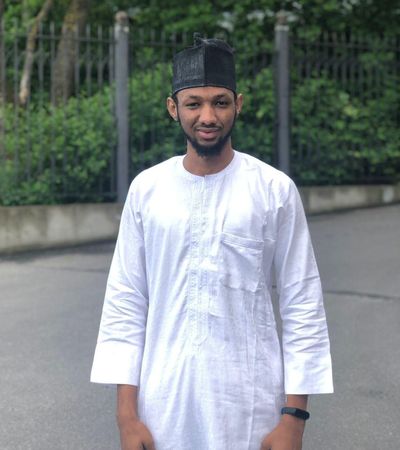Bayero, a Medical Student from Nigeria
"Ukrainians pushed, screamed, and cursed their way to the front of the border - and nobody stopped them. But if a foreigner tried that? They'll kick, hit, anything. They were so, so violent."
On February 26th, we released a story detailing the experiences of four African students as they attempted to flee Ukraine as Russia invaded their territory. The piece, What Africans Students Are Experiencing, recounted the strenuous journeys that the students endured fleeing the Eastern European nation.
Bayero is a Nigerian third-year medical student, attempting to complete his degree in Ukraine. He arrived in the bordering country Poland a week after the initial strike. As a representative of Nigerian students studying in Ukraine, Bayero assisted in the removal of a number of his fellow Nigerian students and continues to hold Twitter Spaces ensuring they have access to the necessary resources.
We caught up with Bayero a couple of months after the initial strike to gain a fuller picture of his trek out of war-torn Ukraine and hear about how he settled in the aftermath. Click here to read other stories in this series.
Donate to Bayero here.
Responses edited for length and clarity.
I’m still in Warsaw – struggling to settle. The transition has been hard, to be honest. It's very different here, more expensive. And then, of course, we did not plan on coming here. We’ve resumed school and have been attending classes online.
When [the war] broke out, we were caught by surprise. We foolishly stayed in Ternopil, even though we had students from the US and UK that left already since their embassies said it wasn’t safe to stay. The school told us that everything was fine. “You're just panicking. All of this is political. It's just propaganda the West is doing against us.” So, foolishly, we stayed back.
They should have looked out for their students, and that's where I'm so disappointed.
As soon as I saw the information, I called students, as I’m a member of the Nigerian Students Union and also I represent the International Students in our school. We told them to grab food first because we weren’t sure if we’d be able to travel. I rushed to the store at 6:00 AM and already there were so many people buying in bulk – anything they could get their hands on. As the hours went by, you could see the city become more chaotic. People were trying to leave, so we could barely get taxis.
Most of the students with me had flight tickets, but all flights were canceled. We rushed to the train station to see if we could catch a train, but now it was too chaotic. We couldn’t get onto any as people were pushing at the doors. There was a selection process – segregation, racism, all sorts of things. At that point, nobody cared. You have no rights. We bought train tickets online, but it was useless – nobody cared. So, you try to push your way in there and they push you back out. They hit us, kicked us. Ukrainians pushed too but were let in with no issues. Some students booked bus tickets. Hours into the evening, they were told that the bus was not coming anymore. It was hell.
No flights, no trains, and you cannot get a bus. We needed to find private drivers, so we called Bolt. We asked a driver if he could take us to the [Polish] border, and he said it's out of their jurisdiction. I asked if he could call his company and he said, "Oh, yeah. How much can we pay?" We told him that we’d pay the normal price that people pay. He made a silly excuse like, "No, that's not going to happen because the government says that men are not allowed to be going to the border. They have to stay back and fight." At that point we realized that we just have to pay whatever it is that they ask us to pay – they’re risking their lives too, but they were just taking advantage of the situation. Usually, you’d pay a hundred bucks for the entire car, now they charged 200 per person. We paid because we had no choice.
We drove for seven hours towards the Polish border at Presdomi. About 15-20 kilometers away from the border, you could see thousands of cars lined up at a dead stop. So, we started walking. That walk was hell. It's Ukraine in the middle of the night – it's minus three degrees and freezing cold and far.
When we arrived, we could see more than a thousand people already waiting there. Some had been waiting at the border for a day, or so. I saw a lady that had two crying babies, and I asked her if I could help push her and her children to the front, which would also give me a way to the front because they would make way. When we got there, we could see foreigners on one side, and the Ukrainians on the other side. Most Ukrainians came in cars or buses, and then had transportation waiting on the Polish side, too. Any Ukrainian that would make their way to the front of the border, even if they would push, scream and curse at the soldiers on their way, made it. Nobody would stop them. But if you, a foreigner, tried that? They'll kick you, hit you, and whatever it is that they want to do. They were so, so violent. We left home on February 24th and crossed the border on the 26th.
